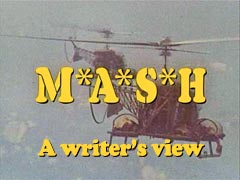M*A*S*H: A writer’s view. #8 in the series.
As you might expect from an eleven-year TV series about a three-year war, the continuity on M*A*S*H was frequently dire. Television in those days was often lax about continuity – the ‘series bible’ was an innovation that had really only come in with Star Trek a few years before, and had not yet fully caught on – but M*A*S*H was an egregious offender.
When the series began, Hawkeye was from Vermont, where he had a mother and a sister living; later he was an only child from Maine, and his mother was dead. Colonel Blake’s wife was originally named Mildred; then she became Lorraine, and Mildred was reused for the name of Colonel Potter’s wife. Potter had a son, and a major plot in one episode concerned the baby pool betting on the sex, weight, and birthdate of his first grandchild. A few years later, that extended family had vanished down the memory hole, and Potter’s only child was a daughter, who had children born before the war.
Chronology got equally short shrift. About five Christmases were crammed into the three-year duration of the Korean War. The date of Potter’s arrival at the 4077th is given as 19 September 1952, but in a late episode (‘A War For All Seasons’) Potter is playing Father Time on New Year’s Eve of 1950 (and again in 1951). A fourth-season episode refers to Vice-President Nixon, who took office in 1953 as Eisenhower’s running mate, but a tenth-season episode has Hawkeye writing a letter to President Truman, Eisenhower’s predecessor. Writers for M*A*S*H soon learnt to avoid tying episodes down to specific dates; but the continual turnover of the staff meant that there was always a new bug ready to make the same mistake.
Major Margaret ‘Hot Lips’ Houlihan, played by Loretta Swit, was only one of two series regulars to last the show’s entire run. It would be unreasonable to expect that the writers would make an exception in her favour to their cavalier attitude; and in fact Margaret is not spared from the general incoherence. Her father, explicitly declared to be dead in an early episode, actually makes a personal appearance in the late episode ‘Father’s Day’. Indeed, Margaret’s development as a character is only made possible by the show’s Silly Putty calendar. Consider: [Read more…]











Recent Comments